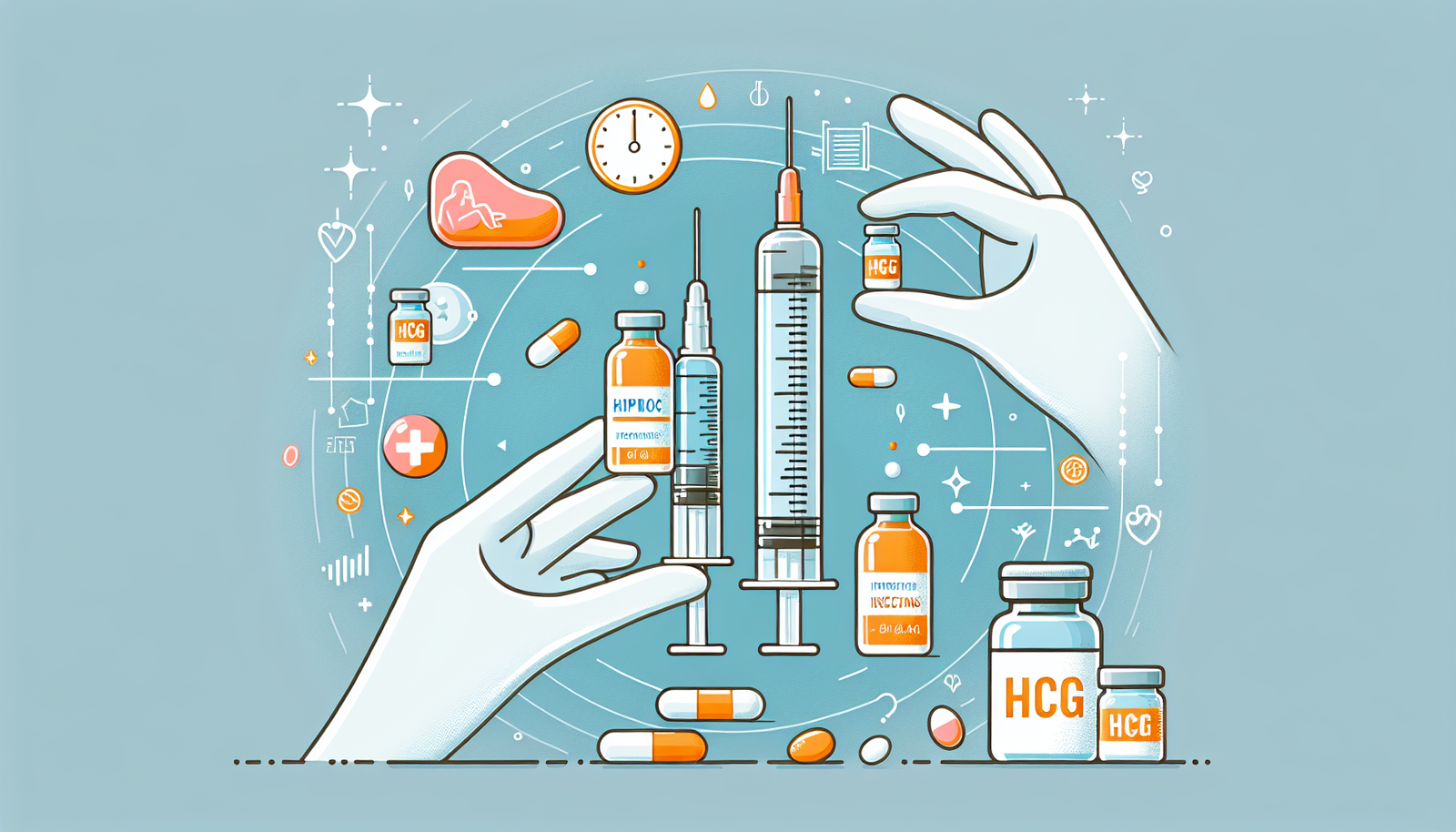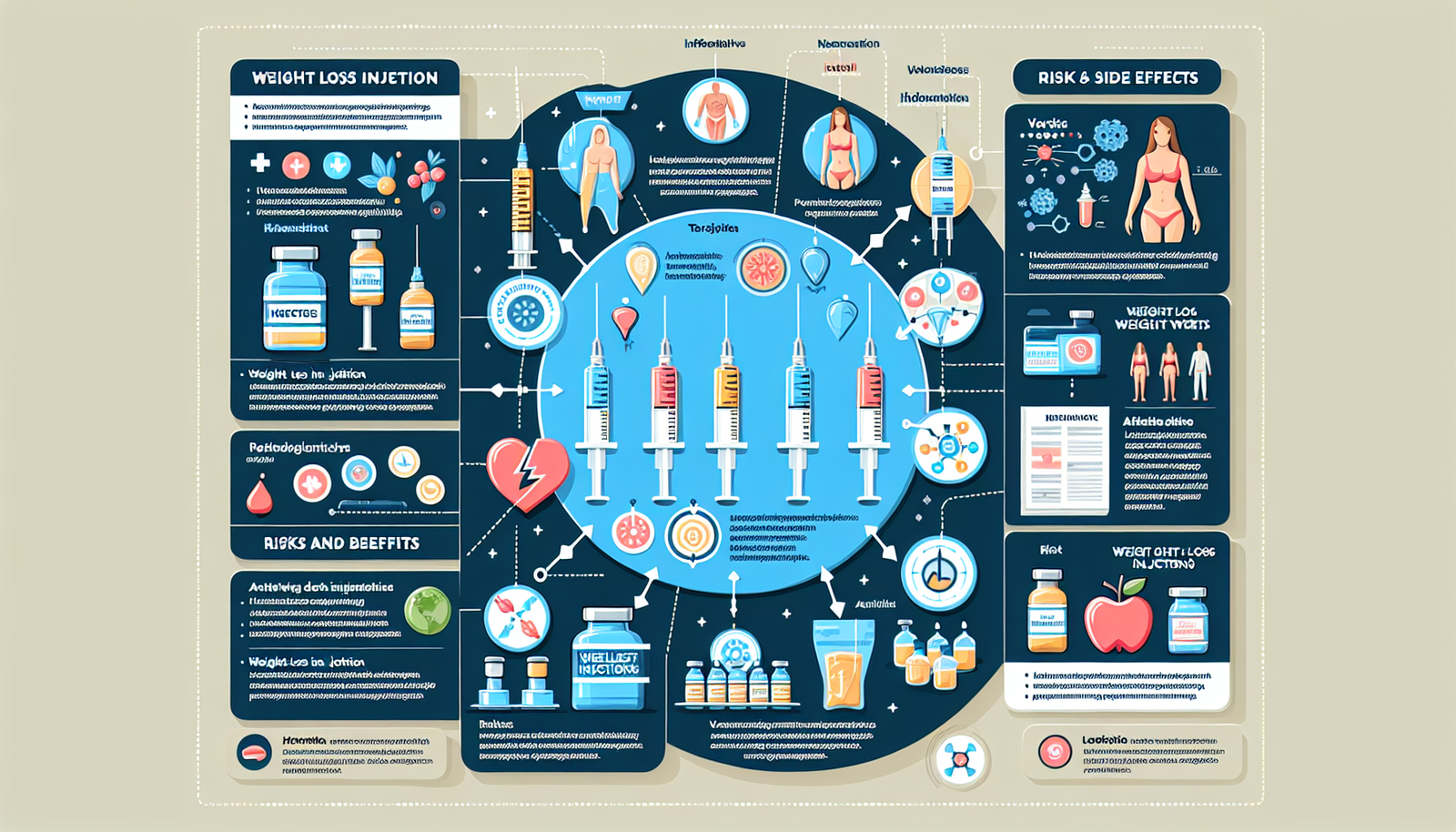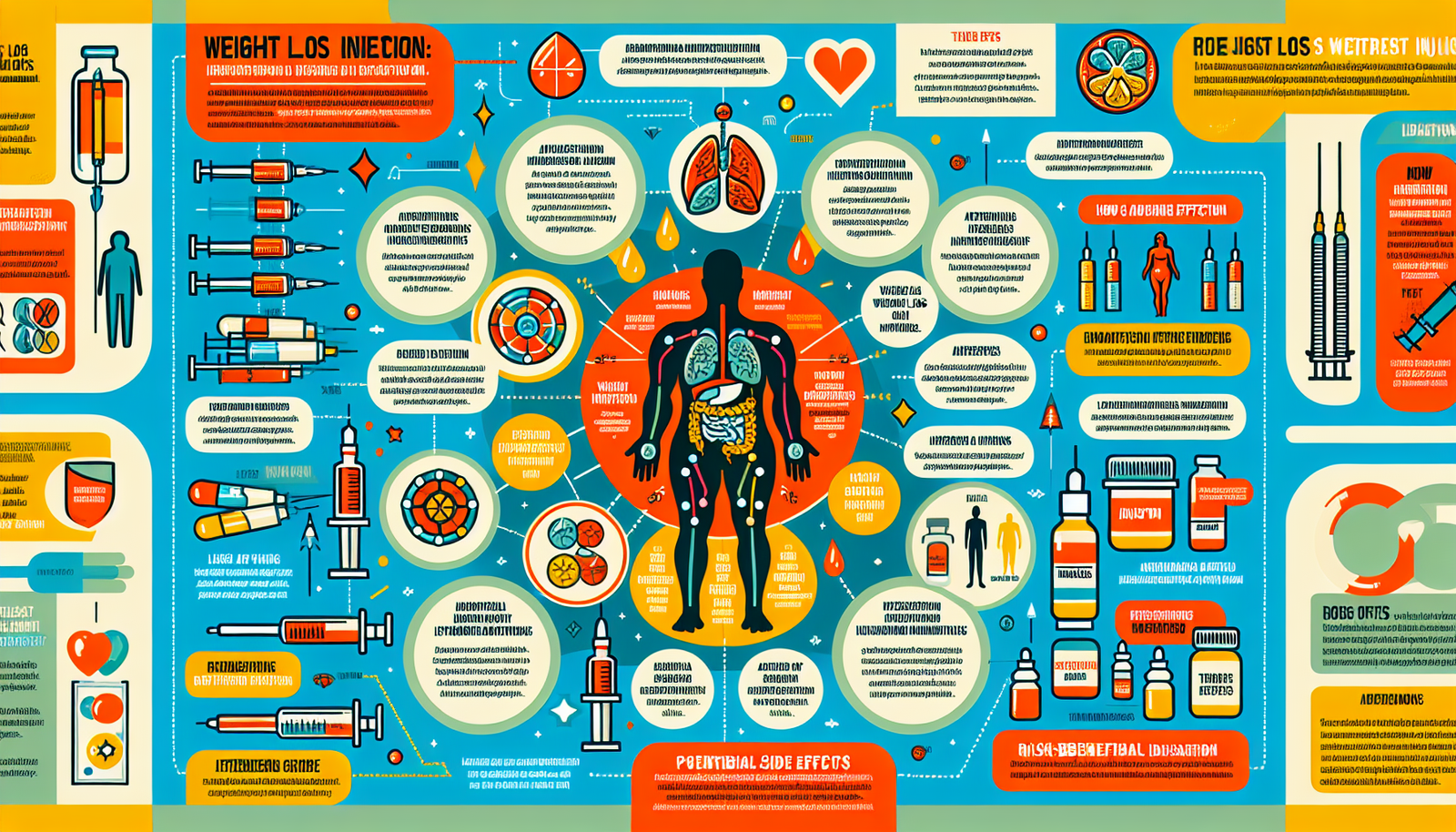
Are you exploring different avenues to facilitate your weight loss journey? The world of weight loss injections may be an intriguing alley worth considering. They can be impactful components of a comprehensive weight management strategy. Numerous types of these injections exist, each possessing unique attributes that can potentially boost your metabolism, burn fat, or reduce your appetite. This article will shed light on some of these types, and in turn, may play a key role in shaping your informed decisions.
Understanding Lipotropic Injections
As you embark on your journey towards achieving your weight loss goals, it’s likely that you’ll come across a variety of aids and tools. Among these aids are lipotropic injections, a type of treatment that is becoming increasingly popular in weight loss circles.
Definition of Lipotropic Injections
So, you’re probably wondering what exactly lipotropic injections are? In simple terms, they are injections that contain a blend of vitamins and amino acids, all of which are known to play significant roles in the body’s use of fat. The prime focus of these injections is to enhance metabolism, promote the breakdown of fat, and aid in the removal of waste products from the body.
How Lipotropic Injections Work
But how exactly do lipotropic injections work? These injections deliver nutrients directly into the bloodstream, which aids in the digesting and removal of fat from the body. They assist in transporting fats to the liver, where they are metabolised and used for energy. This process is essential in breaking down fat deposits and promoting weight loss.
Benefits of Lipotropic Injections
The advantages of lipotropic injections are multi-fold. For instance, apart from weight loss, these injections can boost your overall energy levels. Due to the efficient processing and removal of fats, your body is left with more energy. However, the benefits are not limited to weight loss and energy alone; some studies have also suggested that these injections can have positive impacts on liver function and overall mental wellness.
Side Effects of Lipotropic Injections
While lipotropic injections are beneficial, it’s equally important to understand the potential side effects. Some individuals may experience adverse reactions, including digestive issues, mood swings, and in rare cases, heart palpitations. It’s advised that you consult with a healthcare professional before starting any new treatment.
Human Chorionic Gonadotropin (HCG) Injections
Another common type of weight loss injection is the Human Chorionic Gonadotropin, often referred to as HCG.
Understanding HCG Injections
HCG is a hormone produced in large amounts during the early stages of pregnancy. However, its utility is not limited to pregnancy alone. Over time, HCG injections have gained popularity as a weight loss aid.
Uses of HCG Injections
In terms of weight loss, HCG injections are typically used alongside a low-calorie diet. The hormone works by signaling the brain to release stored fat into the bloodstream, where it is then used as energy. This process contributes to weight loss and assists in muscle retention, while maintaining lower calorie intake.
Impacts of HCG Injections on Weight Loss
Many individuals pursuing weight loss find HCG injections helpful. However, it’s important to note that these injections are not a standalone solution, and their efficacy is significantly enhanced when coupled with a calorie-restricted diet.
Potential Side Effects of HCG Injections
On the downside, HCG injections can cause a variety of side effects. These may include headaches, mood swings, depression, or bloating. In some cases, more serious side effects like ovarian hyperstimulation syndrome in women and prostate cancer in men have also been noted.
Vitamin B12 Injections
Vitamin B12 injections are yet another popular choice for those pursuing weight loss.
What is Vitamin B12
Vitamin B12 is an essential nutrient that plays a vital role in a number of body functions. It is key in the production of DNA, blood cells, and nerves. Moreover, it plays an important role in the metabolism of every cell in the body.
Role of Vitamin B12 in Weight Loss
When it comes to weight loss, Vitamin B12 is believed to boost metabolism and provide an energy boost, which can enhance physical activity levels and subsequently aid weight loss.
Benefits of B12 Injections
Vitamin B12 injections can offer a variety of benefits. Beyond weight loss, they can contribute to improved mood, heightened energy levels, better memory, heart health, healthier skin, and better digestion.
Risks Associated with Vitamin B12 Injections
While they are typically safe, some individuals may experience side effects from B12 injections like light-headedness, diarrhoea, or swelling at the injection site. Long-term overuse of vitamin B12, especially in high doses, could also potentially lead to serious side effects such as blood clots or heart failure.
Insulin Injections and Weight Loss
Insulin injections are commonly used in the management of diabetes, but they also have implications for weight loss.
Link Between Insulin and Weight Gain
Insulin, a hormone produced by your pancreas, is responsible for controlling blood sugar levels. It does this by directing glucose in the bloodstream into cells, where it is used for energy. However, excess insulin can lead to weight gain, as it also promotes the storage of fat in the body.
Using Insulin Injections for Weight Loss
This doesn’t mean insulin can’t be part of a weight loss strategy. By managing blood sugar levels and preventing spikes and dips, they can help maintain stable energy levels and suppress appetite.
Risks of Using Insulin Injections
However, it’s important to closely manage insulin levels because both low blood sugar (hypoglycemia) and high blood sugar (hyperglycemia) can have serious health consequences. Weight gain, bloating, and water retention are commonly reported side effects of insulin therapy.
Glucagon-Like Peptide-1 (GLP-1) Receptor Agonists
GLP-1 receptor agonists are another class of injections used for weight loss.
Understanding GLP-1 Receptor Agonists
GLP-1 is a hormone naturally produced by the body that stimulates insulin release in response to eating. GLP-1 receptor agonists are drugs that mimic this effect, but they last longer in your system than the natural hormone.
Effects on Weight Loss
GLP-1 receptor agonists work by slowing stomach emptying and increasing feelings of fullness after meals. This reduces food intake and leads to weight loss.
Possible Side Effects of GLP-1 Receptor Agonists
Potential side effects include nausea, vomiting, diarrhoea, and loss of appetite. There’s also a slight increase in the risk of pancreatitis – inflammation of the pancreas.
Liraglutide (Saxenda) Injections
Liraglutide, also known as Saxenda, is a popular GLP-1 receptor agonist that has been approved by the FDA for weight loss.
What is Liraglutide?
Liraglutide is designed to act like GLP-1 in the body, stimulating the release of insulin, slowing gastric emptying time, and making you feel fuller for longer.
How Liraglutide Supports Weight Loss
Liraglutide can help you lose weight by reducing your appetite and increasing feelings of fullness, which can help you eat less and reduce your calorie intake.
Potential Risks and Side Effects of Liraglutide
Liraglutide has several potential side effects, including nausea, vomiting, diarrhoea, and constipation. More serious side effects can include pancreatitis, gallbladder disease, renal impairment, and suicidal thoughts.
Bupropion and Naltrexone Injections
Bupropion and Naltrexone are two medications that can be combined in an injection for weight loss.
Understanding Bupropion and Naltrexone
Bupropion is an antidepressant also used for smoking cessation, while Naltrexone is primarily used to treat alcohol and opioid dependence. When combined, they work to curb hunger and food cravings.
Usage in Weight Loss
These injections work by targeting the control centers of the brain that regulate appetite and food cravings. Therefore, the individual experiences a decreased appetite, reduced food intake, and ultimately, weight loss.
Possible Side Effects
Common side effects include nausea, headache, and constipation. Serious side effects can include seizures, an increase in blood pressure or heart rate, liver damage, and manic episodes.
Semaglutide (Wegovy) Injections
Semaglutide is another GLP-1 receptor agonist approved for chronic weight management in adults who are overweight or obese.
What is Semaglutide?
Semaglutide is similar to the natural hormone GLP-1. It’s designed to reduce hunger and thus decrease calorie intake.
How Semaglutide Supports Weight Loss
Semaglutide works by mimicking the function of GLP-1, which regulates appetite by increasing feelings of fullness and reducing hunger. This leads to a reduced calorie intake and therefore contributes towards weight loss.
Potential Risks and Side Effects of Semaglutide
Semaglutide side effects can include nausea, diarrhoea, constipation, and abdominal pain. It’s also important to monitor for signs of pancreatitis and other more serious potential side effects.
Evaluating the Efficacy of Weight Loss Injections
Now that we’ve explored various types of weight loss injections, it’s critical to assess their effectiveness.
Comparing Different Types of Injections
Every type of weight loss injection has its own set of pros and cons. While some might be more effective at promoting weight loss, others might offer additional benefits such as improved mood or increased energy levels. It’s crucial to consider these factors and to consult with your doctor before deciding on a particular weight loss injection.
Research on Efficacy of Weight Loss Injections
There is ample scientific research supporting the efficacy of various weight loss injections. However, these injections work best when part of a comprehensive weight loss program that includes a healthy diet and regular exercise.
Patient Experience and Satisfaction
Patient experiences and satisfaction levels with weight loss injections may vary. What works for one person might not work for another. Therefore, it’s important to be patient and maintain realistic expectations when trying a new weight loss injection.
Risk Factors and Precautions When Using Weight Loss Injections
As with any medical treatment, there are risk factors and precautions when using weight loss injections.
Understanding Overall Health Risks
The possibility of adverse side effects cannot be overlooked. Some weight loss injection side effects can be minor, while others can be potentially serious. You should consult with a healthcare professional before beginning any weight loss injection regimen.
Individual Suitability for Weight Loss Injections
Everyone is unique, and the suitability for weight loss injections can vary widely. Factors such as age, underlying health conditions, and the nature of obesity must be considered to determine if weight loss injections are an appropriate option.
Precautions While Using Weight Loss Injections
Before starting any weight loss injections, it’s necessary to discuss with your healthcare provider and understand all the potential risks and benefits. Monitor your health closely and ensure regular follow-ups. Finally, it’s important to remember that these injections are not a substitute for a healthy lifestyle. They are aids to help you achieve your goals more easily when used in conjunction with a balanced diet and regular exercise.
In conclusion, weight loss injections can be a supportive tool in your weight loss journey. However, they are not magic bullets. Work with a healthcare provider to choose the best option that aligns with your personal health needs and weight loss goals. Remember, the journey to a healthier you is not about quick fixes, but about long-term lifestyle changes.






Leave a Reply